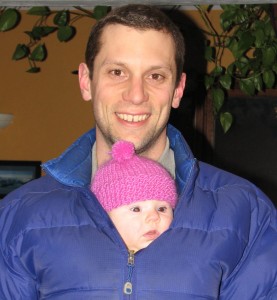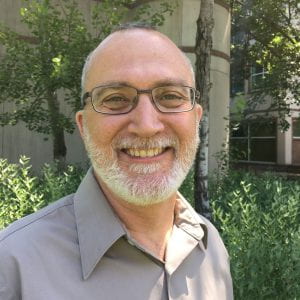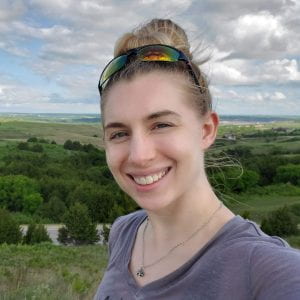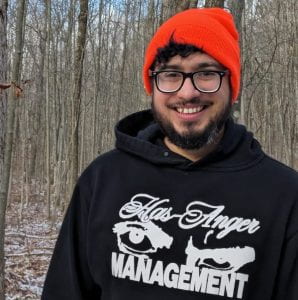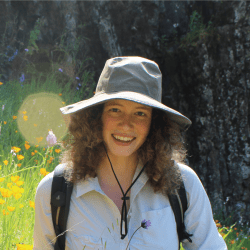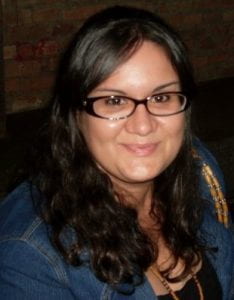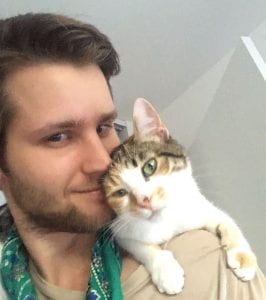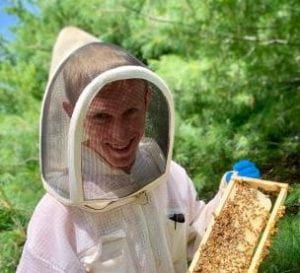Scott McArt, associate professor of pollinator health. My main research interests are chemical and disease ecology, specifically in relation to pesticide and pathogen stress experienced by honey bees, bumble bees, and other wild bees. I have a keen interest in working with stakeholders (e.g., beekeepers and farmers) and regulatory agencies to improve pollinator health. This works well with my 60/40 research/extension appointment. Some more information on my background and interests is located here.
Wee Hao Ng, research associate. Wee Hao’s background is in particle physics, where he worked on physics beyond the Standard Model for his PhD with Yuval Grossman at Cornell. He brings impressive modeling and theory skills to our EEID disease in bees project, where he is currently assessing how bees transmit parasites in complex plant-pollinator networks. Wee Hao is an avid birder and excellent natural historian.
Wayne Anderson, research associate. Wayne received his BS in natural products chemistry from SUNY ESF, his PhD in pharmacology from University of Rochester, then spent 20 years as a chemist in the pharmaceutical industry. At Cornell, he manages our Chemical Ecology Core Facility (CCECF), which features a Thermo TSQ Quantis HPLC-MS/MS, allowing us to investigate pesticide exposure to bees and many other questions related to small molecules. Wayne is an avid canoeist of our local rivers!
Dani Dryer, research support specialist. Dani grew up in upstate New York and fell in love with chemical ecology while receiving her BS at Cornell. She spent two years as a lab manager at St. John Fisher College, then completed a Masters at SUNY ESF researching volatile cues of an obligate parasite of birds in the Galapagos. She then spent three years working for the USDA-ARS in Manhattan, KS on various GC-MS, GC-EAD, and GC-EAG applications before returning to Cornell to join our Chemical Ecology Core Facility (CCECF).
Tomas Quezada, technician. Tomas has been honing his bee disease and molecular screening skills since joining our lab in spring 2022 and working on our BEEID project. Now he’s excited to apply his laboratory diligence to our chemistry work in the Chemical Ecology Core Facility (CCECF). Tomas is hoping to pursue a PhD in herpetology (his true biological passion) in the near future. He’s also a big fan of Bad Bunny.
 Emily O’Neil, technician. Emily obtained her BS from Ithaca College, then worked for the Best Bees Company before coming to our lab. She splits her time between the NYS Beekeeper Tech Team and our USDA OREI organic beekeeping project in collaboration with Margarita Lopez-Uribe’s lab at Penn State and Maggie Couvillon’s lab at Virginia Tech. Emily is a ball of energy and is currently working part-time towards Masters degree in Natural Resources & Environment via the employee degree program.
Emily O’Neil, technician. Emily obtained her BS from Ithaca College, then worked for the Best Bees Company before coming to our lab. She splits her time between the NYS Beekeeper Tech Team and our USDA OREI organic beekeeping project in collaboration with Margarita Lopez-Uribe’s lab at Penn State and Maggie Couvillon’s lab at Virginia Tech. Emily is a ball of energy and is currently working part-time towards Masters degree in Natural Resources & Environment via the employee degree program.
Maureen Page, USDA postdoctoral fellow. Maureen received her PhD from UC Davis while working in Neal Williams’ lab on resource competition between managed honey bees and native wild pollinators. She spent a year working on our BEEID project to understand how disease spillover occurs in plant-pollinator communities, then secured her own USDA fellowship to research when and where resource competition occurs between managed honey bees to native wild pollinators.
Angélica Bianchini Sanchez, postdoctoral associate. Angélica completed her PhD in biochemistry from the University of São Paolo in 2017, then worked as a postdoc and adjunct faculty at the Center for Biological Sciences at the Federal University of Ouro Preto (Brazil) before coming to our lab. At Cornell, she’s using her impressive analytical chemistry expertise to improve our multi-residue LCMS pesticide analysis, and she’s taking a toxicogenomics approach to understanding why certain pesticides harm bees while others don’t.
Tobias Mueller, PhD student. Tobias is co-advised by myself and Bryan Danforth. He completed his undergrad at UC Davis, then spent a few years working as a technician with Jay Rosenheim, Sacramento-Yolo Mosquito & Vector Control, and most recently as a lab manager in Rachel Vannette’s lab. For his dissertation, Tobias is exploring how glandular secretions by solitary bees impact their microbiome and how antimicrobials impact bee health in agricultural settings.
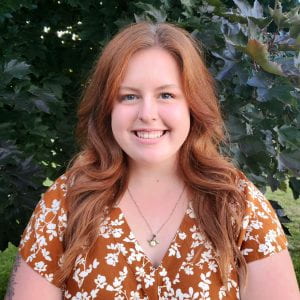 Shianne Lindsay, PhD student. Shianne completed her undergrad at SUNY ESF, where she got hooked on bees by contributing to the Empire State Native Pollinator Survey. She continued with bees during Masters at the University of Nebraska with Autumn Smart, where she assessed how land use change, floral preferences, and seed mix design impacted the wild bee community and competition with honey bees in restored habitats. At Cornell, Shianne is working with Mott’s/KDP to improve pollinator-friendly practices at NY apple orchards. Shianne is an excellent bee taxonomist!
Shianne Lindsay, PhD student. Shianne completed her undergrad at SUNY ESF, where she got hooked on bees by contributing to the Empire State Native Pollinator Survey. She continued with bees during Masters at the University of Nebraska with Autumn Smart, where she assessed how land use change, floral preferences, and seed mix design impacted the wild bee community and competition with honey bees in restored habitats. At Cornell, Shianne is working with Mott’s/KDP to improve pollinator-friendly practices at NY apple orchards. Shianne is an excellent bee taxonomist!
Ben DeMoras, Masters student. Ben graduated from Cornell in 2022, spent five months as a technician with the NYS Beekeeper Tech Team, then started to work on his Masters, which is attempting to understand where organic honey production and certification can occur in the Northeastern U.S. via a USDA OREI grant in collaboration with Margarita Lopez-Uribe’s lab at Penn State and Maggie Couvillon’s lab at Virginia Tech. Ben is particularly interested in research and extension that can increase profitability and sustainability of the beekeeping industry. He’s an expert web designer and currently manages content for the Cornell Pollinator Network site.
LAB ALUMNI/AE
Lab managers
David Sossa, lab manager (2022-2024), currently farm manager in Colombia.
Paige Muñiz, lab manager (2017-2022), currently administrator in Denver, CO.
Research associates
Dr. Nicolas Baert, research associate (2017-2021), currently lead LCMS chemist at FILAB, France
Postdocs
Dr. Kate LeCroy, USDA postdoctoral fellow (2021-2023), currently Assistant Professor at Rhodes College
Dr. Daiana De Souza, postdoctoral associate (2019-2021), currently Ecotoxicologist at BASF
Dr. Aaron Iverson, postdoctoral associate (2017-2019), currently Assistant Professor at St. Lawrence University
Dr. Christine Urbanowicz, postdoctoral associate (2018-2019), currently Geospatial Analyst at USAID
Dr. Peter Graystock, postdoctoral associate (2017-2018), currently Independent Research Fellow, Imperial College London
Graduate students
Leah Valdes, PhD (2021-2025). Dissertation: “Social behavior and the ecology of disease.” Currently Alaska Sea Grant Fellow, Juneau, AK.
Kaitlin Deutsch, PhD (2017-2023). Dissertation: “Small but mite-y: Varroa mites may drive virus spillover and impact wild bee health.” Currently postdoc with Jamie Ellis at University of Florida.
Kass Urban-Mead, PhD (2017-2022). Dissertation: “Bees in the woods: Spring orchard pollinators use forest canopy pollen.” Currently Pollinator Conservation Specialist at Xerces Society for Invertebrate Conservation, Philadelphia, PA.
Timothy Salazar (2018-2021). Cornell Ecology and Evolutionary Biology, Co-advised with Dr. Stephen Ellner.
Hailey Scofield (2019-2021). Currently CEO of the very cool company she founded, Combplex, which uses lasers to control varroa mites in honey bee colonies.
Laura Figueroa, PhD (2015-2020): Dissertation: “Bee pathogen transmission in plant-pollinator networks.” Currently Assistant Professor in the Department of Environmental Conservation at UMass-Amherst.
Nelson Milano, MS (2016-2018): Thesis: “Comparative survival and fitness of bumble bee colonies in natural, suburban, and agricultural landscapes.” Currently Watershed Coordinator at the Audubon Society, Pittsburgh, PA.
Extension associates
Travis Grout, NYS Beekeeper Tech Team economic analyst (2018-2020), currently Natural Resource Economist at ERT, Inc.
Mary Kate Wheeler, NYS Beekeeper Tech Team economic analyst (2016-2018), currently Farm Business Management Specialist, Cornell Cooperative Extension.
Technicians
Christina Zhao (2021-2025)
Connor Hinsley (2018-2024, NYS Beekeeper Tech Team)
Lauren Cody (2023), currently teacher with the Japan Exchange and Teaching Programme
Catherine Crosier (2022-2023), currently Field Specialist with Bee Informed Partnership
Fiona Marks (2021)
Marie Russell (2021, 2023), currently Research Scientist at Iowa State University
Phoebe Koenig (2018-2020), currently Alaska Sea Grant Fellow, Juneau, AK.
Casey Hale (2019-2020)
Ashley Fersch (2016-2018), currently Intermediate School Personal Care Assistant at Environmental Charter School, Pittsburgh, PA
Sarah Bluher (2015-2016)
Undergraduate Honors students
Talli Weiss, senior Honors thesis (2025): “A pollinator’s playlist: Individual foraging repertoires and ‘favorites’ of bumble bees over time”
Lauren Cody, senior Honors thesis (2023): “Inadequate Varroa mite management, honey bee density, and distance from the apiary drives virus spillover onto flowers”
Max Cantelmo, senior Honors thesis (2023): “An evaluation of pollen specialization by Osmia georgica (Hymenoptera: Megachilidae)”
Jeremy Gutierrez, senior Honors thesis (2023): “Disparate outcomes of wasp parasitism for native and non-native mason bees (Hymenoptera: genus Osmia) inside bee hotels.” Currently PhD student with Coby Schal at NC State University,
Emma Harte, senior Honors thesis (2022): “Impact of Deformed Wing Virus (DWV) on wild bee survival”
Christina Zhao, senior Honors thesis (2021): “A look into exposure and risk from pesticides to bees in apple orchards”
Abby Davis, senior Honors thesis (2019): “Thinking beyond bees to inform pollinator disease transmission dynamics: Eristalis flower flies (Diptera: Syrphidae) are non-host vectors of the common bee parasite, Crithidia bombi.” Currently PhD student with Romina Rader and Manu Saunders at UNE Australia.
Casey Hale, senior Honors thesis (2019): “Pesticide risk predicts bee visitation and richness within conventionally and organically managed strawberry systems”
Julie Kapuvari, senior Honors thesis (2019): “A systematic review on the risk of neonicotinoid insecticides to wild bees”
Sally Compton, senior Honors thesis (2017): “Functional traits of wild bees predict pathogen prevalence”
Lauren Truitt, senior Honors thesis (2017): “A trait-based model of disease transmission in plant-pollinator networks”
Undergraduate researchers
Lily Blanton (2024-2025)
Lauren Cody (2020-2023)
Jeremy Gutierrez (2019-2023)
Max Cantelmo (2021-2023)
Mikayla Zarr (2021-2023)
Savannah Figueroa (2021-2023)
Hanifah Muhammad, summer REU student from Arizona State University (2022)
Tori Adigun, summer REU student from Florida A&M University (2022)
Lauren Comeau, summer REU student from Mt. Holyoke College (2022)
Angela Yuan (2022)
Ben DeMoras (2021-2022)
Catherine Crosier (2018-2022)
Emma Harte (2020-2022)
Michelle Hassan, summer REU student (2021)
Christina Zhao (2019-2021)
Leeah Richardson (2018-2019)
Olivia Miller (2018-2019)
Alondra Torres, summer REU student from University of Puerto Rico (2019)
Mesly Mata, summer REU student from Oklahoma State University (2019)
Jiawen Yang (2018-2019)
Emma Williams (2017-2019)
Blyssalyn Bieber, summer REU student from Misericordia University (2018)
Annika Salzberg (2018)
David Lewis (2016-2018)
Mahilet Kebede (2017)
Marcel Ramos (2016-2017)
Trebor Hall (2016-2017)
Joshua Roberts (2015-2016)
Nolan Amon (2016)
Rosie Nagele (2015)
Carlee Roberts (2015)
Tim Jalbert (2015)
Emily Wafler (2014-2015)
High school interns
Anna Fulbright (summer 2022)
Lillian McCormick (summer 2019)
Elena Suarez (summer 2018)
Shuyun (Alina) Xiao (summer 2016)
Ben Losey (summer 2015)

